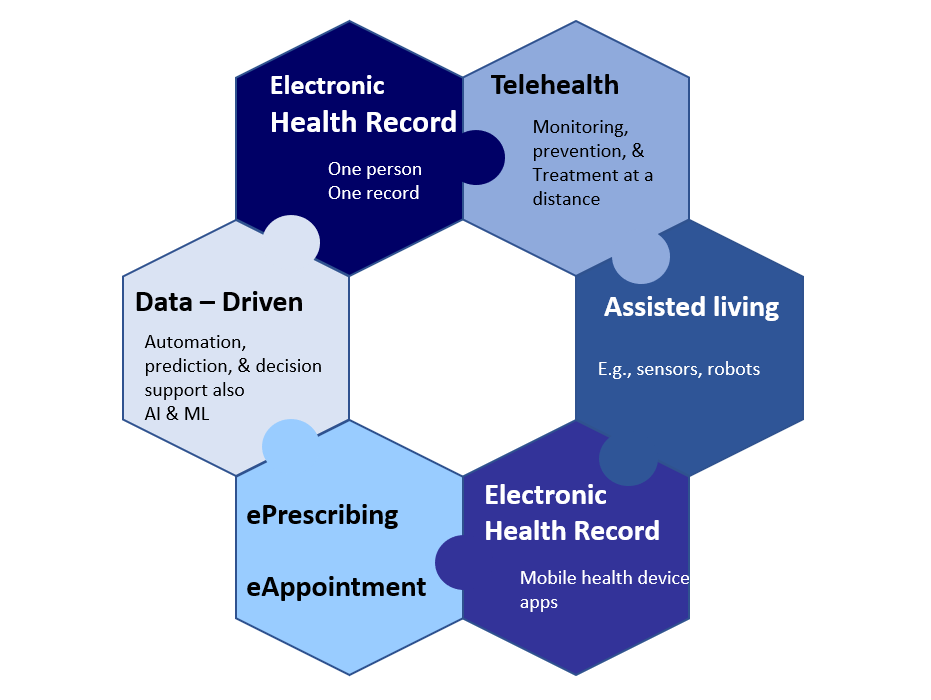Last update: 21 November 2023
Digital Health is on the rise and policy and regulatory frameworks are required to shape the future of Digital Health and healthcare. In 2018, the European Commission concluded that health and care systems in the European Union (EU) require reforms and innovative solutions to keep the quality of care and improve accessibility. Health systems promoting health and providing patient-centred care in the EU face severe challenges in delivering health care services. These challenges include an ageing population, human resource shortage- particularly doctors and nurses, limitations in managing “big data”, rapidly growing medical knowledge, innovative technologies, and a limited budget [1].
What is Digital Health?
Digital Health, as presented in Figure 1, refers to a wide range of technologies and services such as digital technologies, electronic medical and health records, telehealth, mHealth, assisted-living devices, data-driven automation, prediction, and decision support. Each of these technologies has certain features and provides specific advantages to the health sector [2].

Figure 1: Digital health classification field
Why is it important to integrate Digital Health in Healthcare Systems?
Digital transformation data has become central to health systems. Nowadays system performance is evaluated whether through collecting and analysing big data with digital technologies (e.g. AI, ML) or “personalised data” in the form of universal electronic record systems and/or customised treatment protocol information. The combination of real-world evidence, generated from health outcomes, and recommendation on how to address gaps identified via the analysis of big data, enables policymakers to make more informed decisions and allocate scarce health resources more efficiently. Ultimately the generated knowledge helps better surveillance, planning, management and improvement of the healthcare systems.
However, as with any disruptive innovation, the growth of digital health also brings challenges to the healthcare system, including who owns, controls, and manages the data being collected and how to maintain privacy [3]. To tackle this, the EC proposed a set of actions to boost excellence in AI, and rules -‘AI Regulation Proposal’ (the first-ever legal framework on AI) – to ensure that the technology is trustworthy [4].
Learning Resources
Take your skills to new heights by earning certification in emerging fields like Digital Health! Explore the EUPATI Open Classroom and delve into the module ‘Digital Health: Introduction – Classification – Impact‘ to deepen your understanding of the Digital Health landscape. Strengthen your expertise, empowering you to advocate for, engage in discussions, and play a pivotal role in implementing key elements that align with your vision for the healthcare system.
References
[1] European Commission. (2021). Excellence, trust, and artificial intelligence. Retrieved from https://ec.europa.eu/info/strategy/priorities-2019-2024/europe-fit-digital-age/excellence-trust-artificial-intelligence_en
[2] European Commission. (2018). Communication on enabling the digital transformation of health and care in the Digital Single Market; empowering citizens and building a healthier society | Shaping Europe’s digital future. Accessed May 22, 2022. https://digital-strategy.ec.europa.eu/en/library/communication-enabling-digital-transformation-health-and-care-digital-single-market-empowering
[3] Meskó, B., Drobni, Z., Bényei, É., Gergely, B., & Győrffy, Z. (2017). Digital health is a cultural transformation of traditional healthcare. Mhealth, 3, 38-38. https://doi.org/10.21037/MHEALTH.2017.08.07
[4] Organisation for Economic Co-operation and Development. (2021). OECD Health Working Paper No. 129: Empowering the health workforce to make the most of the digital revolution. https://www.oecd-ilibrary.org/docserver/37ff0eaa-en.pdf?expires=1659692703&id=id&accname=guest&checksum=837633414E08CB8F3481B65238280DE4


